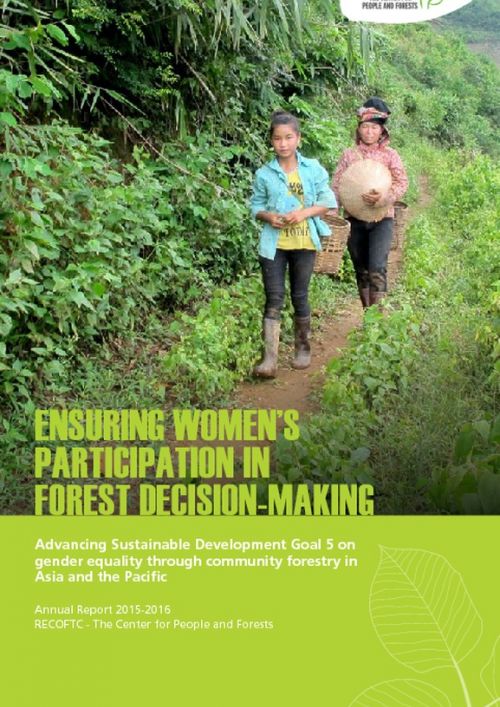APA 6th ed. Ensuring Women’s Participation in Forest Decision-Making: Annual report 2015-2016. (2016, January 1). Retrieved from https://www.recoftc.org/publications/0000157
MLA 8th ed. Ensuring Women’s Participation in Forest Decision-Making: Annual report 2015-2016. RECOFTC, 1 January 2016, https://www.recoftc.org/publications/0000157.
Chicago 17th ed. RECOFTC. 2016. "Ensuring Women’s Participation in Forest Decision-Making: Annual report 2015-2016." Published January 1, 2016. https://www.recoftc.org/publications/0000157.
Ensuring Women’s Participation in Forest Decision-Making: Annual report 2015-2016

Community forestry – as promoted by RECOFTC – provides an effective and cross-cutting solution that is aligned with the SDGs. This includes SDG goal 5 to achieve gender equality and empower all women and girls. RECOFTC has long understood that the long-term viability of community forest management is dependent on the inclusion of women. RECOFTC works to ensure that policies and programs of forestry stakeholders mainstream gender dimensions so that they are not at risk of creating or exacerbating inequalities, and ignoring women’s contribution to livelihoods. Thus in this annual report, RECOFTC highlights our achievements that contribute to SDG 5.
In addition to the work on SDG 5, our work is guided by a set of values that enable the achievement of positive impacts and contributions to several SDGs. RECOFTC is well positioned to present local people’s concerns in global discussions on forests and to drive debates, particularly on the social dimension of emerging political, economic and environmental issues that will impact the SDGs’ level of success. Forests that are owned and managed by communities, as well as individual households, are anticipated to double in size, with countries like Cambodia, Indonesia and Myanmar contributing significant lands to local ownership and recognizing customary rights.
Gender equality will continue to cut across all of RECOFTC’s thematic areas. For example, RECOFTC will focus on encouraging gender-sensitive benefit distribution mechanisms in forestry and climate change programs that further promote gender equality in natural resource management, conflict mitigation strategies, small scale forest enterprise development, and participatory land use planning. Through strengthening women’s leadership skills, key stakeholders will be empowered to exercise greater decision-making roles and ensure their needs are met in natural resource management efforts.
Through supporting the SDGs, RECOFTC’s vision of empowering local people to be effectively and equitably engaged in the sustainable management of forested landscapes will be achieved. RECOFTC stands ready to work with partners in and beyond its focal countries to achieve the SDGs and other global commitments.

